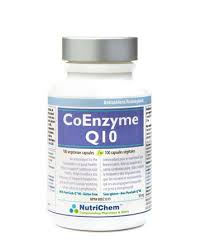Physiological effect of Coenzyme Q10
Oct 17,2019
Coenzyme Q10 is a vitamin-like substance found throughout the body, but especially in the heart, liver, kidney, and pancreas. It is eaten in small amounts in meats and seafood. Coenzyme Q10 can also be made in a laboratory.CoQ10 is found in most body tissues. The lowest amounts are found in the lungs. CoQ10 decreases in the body as people get older.

Physiological effect
A coenzyme helps an enzyme do its job. An enzyme is a protein that speeds up the rate at which chemical reactions take place in cells of the body. The body's cells use CoQ10 to make energy needed for the cells to grow and stay healthy. The body also uses CoQ10 as an antioxidant. An antioxidant protects cells from chemicals called free radicals.
Coenzyme Q10 is most commonly used for conditions that affect the heart such as heart failure and fluid build up in the body (congestive heart failure or CHF), chest pain (angina), and high blood pressure. It is also used for preventing migraine headache, Parkinson disease, and many other conditions.
Correlational studies
In laboratory studies, tumor cells are used to test a substance to find out if it is likely to have any anticancer effects. In animal studies, tests are done to see if a drug, procedure, or treatment is safe and effective in animals. Laboratory and animal studies are done before a substance is tested in people.
Side effects
Reported side effects from the use of CoQ10 include the following:
High levels of liver enzymes.
Nausea.
Heartburn.
Headache.
Pain in the upper part of the abdomen.
Dizziness.
Rashes.
Unable to fall sleep or stay asleep.
Feeling very tired.
Feeling irritable.
Sensitive to light.
It is important to check with health care providers to find out if CoQ10 can be safely used with other drugs. Certain drugs, such as those that are used to lower cholesterol, blood pressure, or blood sugar levels, may decrease the effects of CoQ10. CoQ10 may change the way the body uses warfarin (a drug that prevents the blood from clotting) and insulin.
- Related articles
- Related Qustion
- The toxicity Studies of Coenzyme Q10 Jan 25, 2024
Coenzyme Q10 is a member of the ubiquinone family of compounds. All animals, including humans, can synthesize ubiquinones. Hence, coenzyme Q10 is not considered a vitamin.
- What are the benefits of Coenzyme Q10? Jan 4, 2024
Coenzyme Q10 may help protect the skin, brain, and lungs, and prevent chronic diseases such as cancer or diabetes. Low levels of coenzyme Q10 may be associated with conditions such as cancer, diabetes and neurodegenerative diseases.
- Coenzyme Q10 deficiency is associated with those diseases? Nov 13, 2023
Coenzyme Q10 deficiency may be associated with a variety of diseases including heart failure, Parkinson's disease, Alzheimer's disease, amyotrophic lateral sclerosis, and stroke.
Pirbedil, also known as tasuda, Pronoran, Trivastal Retard, is clinically used as peripheral vascular and cerebral vasodilator.....
Oct 17,2019APIEleutheroside is an active substance extracted from the roots and rhizomes of Acanthopanax senticosus (Rupr. et Maxim) Harms.....
Oct 17,2019Plant extractsCoenzyme Q10
303-98-0You may like
- Coenzyme Q10
-

- $0.00 / 10g
- 2025-04-19
- CAS:303-98-0
- Min. Order: 10g
- Purity: 99% HPLC
- Supply Ability: 10000
- Coenzyme Q10/Ubidecarenone
-

- $10.00 / 1kg
- 2025-04-18
- CAS:
- Min. Order: 1kg
- Purity: HPLC≥98%
- Supply Ability: 10000
- Ubidecarenone
-

- $10.00 / 1KG
- 2025-04-18
- CAS:303-98-0
- Min. Order: 100KG
- Purity: 99%
- Supply Ability: 100 mt






